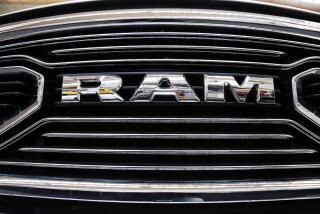Mazda Execs Cut Own Pay; Mishandled Auto Defect : Business ethics: The top 18 reduce their wages for 3 months. ‘This is the Japanese way,’ an aide says.
- Share via
TOKYO — When Ford Motor Co. was caught falsifying emissions test records in 1973, company executives showed little remorse, simply paying the $7-million fine out of company coffers.
That isn’t the way things work in Japan.
Mazda Motor Co., in a show of contrition unusual even for Japan, said Wednesday its top executives had agreed to accept temporary pay cuts to take responsibility for mishandling safety problems in some of its passenger cars.
President Norimasa Furuta and 17 other executives will take salary cuts of 5% to 10% in the first three months of 1991. Since Japanese executives rarely earn more than a few hundred thousand dollars annually--far less than their American counterparts--the givebacks amount to more than a symbolic sacrifice by the Mazda officials.
“It’s the notion of top management falling on the sword first,” said James Abegglen, an expert on Japanese management. “It’s a loud message to the organization. The next step is to exact punishment from the staff.”
The announcement came one day after the Transport Ministry publicly chided Mazda for trying to keep secret some problems in Luce model cars made between August, 1986, and January, 1987. The Luce, a top-of-the-line sedan, was not sold in the United States.
Only after the warning did Mazda agree to recall nearly 3,500 cars to replace defective switches that affected the operation of brake lights and cruise-control mechanisms in the car.
Furuta apologized publicly to dealers and customers for the shortcomings, and in a broadcast to employees Wednesday morning called for a serious effort to improve quality and customer service.
“This is not a disciplinary action. No one forced us to cut salaries,” said Akira Shigemasa, a Mazda spokesman. “The president offered to cut his salary and other top executives agreed.”
“This is the Japanese way,” he said.
It is not uncommon for top executives to take pay cuts when the company is facing economic difficulties. Mazda executives have taken such cuts twice in the past 15 years when profits were down sharply. This is apparently the first time, however, that Japanese executives have taken a pay cut to take responsibility for quality and service problems.
The Mazda action came after a series of articles in Asahi Shimbun--Japan’s most prestigious daily newspaper--pounded the company for quietly replacing the switches on the automobiles of customers who complained rather than moving quickly to warn all customers of the problem by conducting a complete, public recall.
The article also mentioned two prior cases in which Mazda tried to deal with quality problems by offering to fix defects through special free servicing “campaigns.” In both cases, Mazda was late in announcing a public recall.
It is unclear whether Mazda’s delays in implementing recall programs have resulted in any accidents.
Japanese auto companies frequently resort to “free service” deals in an effort to avoid adverse publicity, said an official of the Japan Automobile Consumers Union, a nonprofit group. He speculated that Mazda executives offered to cut their salaries as part of a deal with the Transport Ministry to avoid being slapped with the $770 fine normally imposed for such transgressions. While nominal, he said, the fine would be considered even more of an embarrassment to the company than the salary cut.
While Mazda has been heavily criticized in Japan for its irresponsibility, U.S. observers praised the willingness of Mazda’s senior management to accept blame for its misjudgments.
“Mazda is doing what it ought to do,” said Clarence Ditlow, executive director of the Center for Auto Safety, a nonprofit Washington group founded by consumer advocate Ralph Nader. “We would doubt that American companies would do the same.”
Ditlow noted that when Ford Motor Co. was fined $7 million in 1973 for falsifying auto-exhaust test reports, “Ford’s shareholders paid that fine instead of the executives.” Ford officials could not be reached for comment since the firm’s suburban Detroit headquarters is shut down for the holidays.
In contrast, Japanese executives have frequently taken the blame for problems in their companies.
In 1985, Japan Air Lines’ president and vice president resigned to take responsibility for a plane crash that killed 520 passengers. In October of this year, the president of Sumitomo Bank stepped down because of illegal activities by the head of one of the bank’s branches. Later in the month, Mitsui Trust and Banking Co. cut the salaries of its top executives by 20% following disclosures that several key employees of the huge trading company had been involved in tax evasion.
The notion behind such resignations is that the top executives should take responsibility for anything that goes on in a company. “We have a saying in Japan,” said a Mazda official. “The emperor suffers first and takes his pleasure last.”
When a top official resigns--or in this case takes a pay cut--the firm hopes to show the public that it is truly sorry and plans to pay serious attention to the problem.
Apology is a critical part of rehabilitation in the eyes of Japanese society.
By contrast, Abegglen said, “the U.S. company will fire the factory manager and the (quality control) supervisor and go gaily about their way.”
Mazda’s image problems come at an inopportune time. The company--Japan’s No. 4 car maker--has introduced several successful models, including the Miata, and has been “picking up market share at a furious rate,” Abegglen said. “This is an enormous blow to the company.”
Times staff writer Tom Furlong in Los Angeles contributed to this story.






